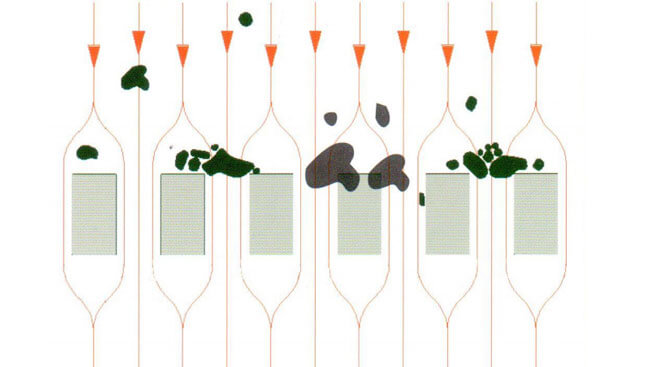In casting production, filtration of molten metal is a key link to ensure the quality of castings. As a professional porous ceramic filter manufacturer, SEFU analyzes the differences in the characteristics of foam ceramic and honeycomb ceramic filters to help you make the right choice.
Core Performance Comparison of Porous Ceramic Filters
Filtration Mechanism
Foam ceramic filter: The three-dimensional mesh structure has a high porosity and can intercept tiny impurities below 20μm by achieving deep filtration. The tortuous pore structure can absorb more oxides and slag, and the filtration efficiency is usually more than 90%. It is especially suitable for alloys such as aluminum, copper, and cast iron that are prone to fine inclusions. If you pursue higher filtration accuracy (such as aluminum alloys and precision castings), foam ceramic filters are better.
Straight-pore honeycomb ceramic filter: The pores are arranged in a straight line, mainly relying on surface interception, and the filtration effect on larger particles (such as above 50μm) is better. However, it has low flow resistance and is suitable for occasions where the requirements for filtration accuracy are not extremely strict. It is often used for filtration of molten metals such as ductile iron.
Mechanical strength
Ceramic foam: Silicon carbide (SiC) material can withstand high temperatures of 1500°C and is suitable for high-temperature molten metals such as molten iron and copper. It has excellent thermal shock resistance. Because its porous structure can buffer thermal stress, it is not easy to crack and is suitable for repeated heating/cooling conditions. However, if it is subjected to severe impact (such as high-speed pouring), local damage may occur.
Straight-pore honeycomb ceramics: Straight-pore structures are prone to cracking when the temperature changes rapidly, so they need to be preheated carefully. It has higher compressive strength and is more suitable for high-pressure and high-speed pouring conditions.
How to choose a porous ceramic filter for casting? Key considerations
When choosing a casting ceramic filter, it is necessary to comprehensively consider the type of metal (such as aluminum, copper, iron, steel), melt temperature, required filtration accuracy (PPI value), casting process (high pressure/low pressure/gravity pouring) and cost-effectiveness. Different metals need to match the temperature resistance, such as silicon carbide filters for cast iron, precision castings require higher PPI values, and foam ceramics are more suitable for high filtration accuracy requirements.
At the same time, the supplier’s product stability, technical support and delivery capabilities need to be evaluated to ensure that the filter achieves the best economic benefits while improving the quality of castings. SEFU provides professional selection guidance to help you accurately match your needs.
SEFU’s professional casting filtration solutions
SEFU is a porous ceramic filter manufacturer with a complete ceramic filter production line. It provides a full range of silicon carbide foam ceramics and straight-pore ceramic filters, supporting customized pore size (10PPI-50PPI), size and shape to ensure matching different casting needs. Our products have undergone strict quality inspection and have:
- High-purity silicon carbide materials, high temperature resistance and thermal shock resistance.
- Optimized pore structure, balance filtration efficiency and flow performance.
- Fast delivery to meet urgent production needs.
Need to know more about the product information or get samples? Please feel free to contact our technical team, we will provide you with professional support!
📞 Phone: 8613785803358
📧 Email: info@sf-foundry.com
🌐 Official website: www.sf-foundry.com
Choose SEFU, choose a reliable metal liquid filtration expert!


